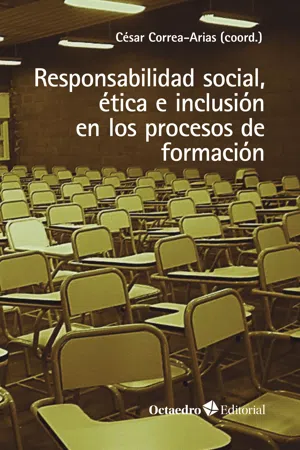
Responsabilidad social, ética e inclusión en los procesos de formación
- 256 páginas
- Spanish
- ePUB (apto para móviles)
- Disponible en iOS y Android
Responsabilidad social, ética e inclusión en los procesos de formación
Información del libro
El presente texto permite abordar, a través de la pluma de 18 investigadores de Iberoamérica, la conjunción problemática y enriquecedora entre la responsabilidad social, la ética y la inclusión social en el interior de los procesos de formación.Los textos ubican el análisis de los procesos de formación de estudiantes de todos los niveles educativos. Algunos de ellos se ocupan de los tiempos de incertidumbre y confusión, no solo por las condiciones sanitarias que demanda la actual pandemia, sino también por las situaciones sociales que muestran claramente un significativo deterioro de nuestras condiciones de existencia.De igual modo, otros autores sitúan su estudio en pueblos originarios, en organizaciones y corporaciones, y en la sociedad en general, pero, lejos de optar por una visión apocalíptica, los textos mantienen una seriedad y un mensaje alentador y educativo.La obra nos propone un variado menú de propuestas teóricas, que van desde las teorías sobre el reconocimiento, el papel de la memoria en la construcción de narrativas, de subjetividades e intersubjetividades, la hermenéutica fenomenológica, la antropología fenomenológica, la deontología, la ontología de las relaciones sociales, las teorías sobre la cultura, el giro decolonial, las epistemologías del sur y las epistemologías meridionales, la hospitalidad y la equidad epistémicas, la legitimidad social o los derechos humanos, hasta la pedagogía crítica, la ecopedagogía, la ecología de saberes o la formación ética ciudadana, orientados todos estos temas hacia la responsabilidad social, la ética y el reconocimiento social en espacios formativos.Es nuestro interés, a través de este texto, apoyar la docencia mediante una reflexión crítica acerca de la importancia de conjuntar en un debate serio y en unas prácticas significativas la necesidad inminente de integrar la responsabilidad social, la ética y la inclusión de los sujetos en los procesos de formación en instituciones justas, autónomas y democráticas.
Preguntas frecuentes
Información
Índice
- Portada
- Créditos
- Dedicatoria
- Sumario
- Agradecimientos
- Introducción
- I. RETOS DE LA FORMACIÓN EN TIEMPOS DE INCERTIDUMBRE
- II. INCLUSIÓN SOCIOEDUCATIVA, INTERCULTURALIDAD Y GLOBALIZACIÓN
- III. RESPONSABILIDAD SOCIAL, CIUDADANÍA Y EDUCACIÓN
- Biodata de los autores
- Índice